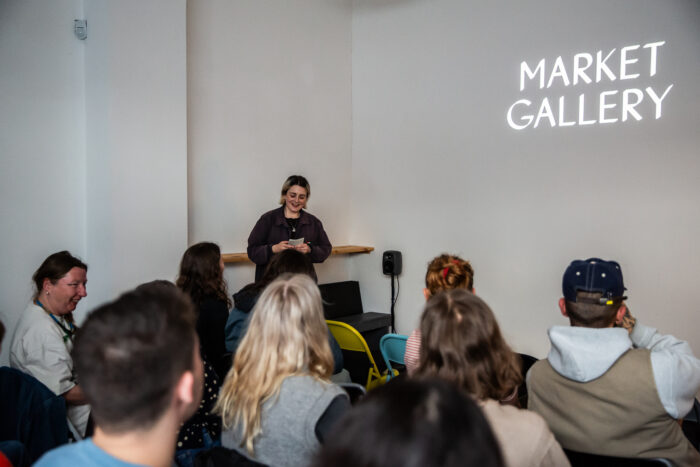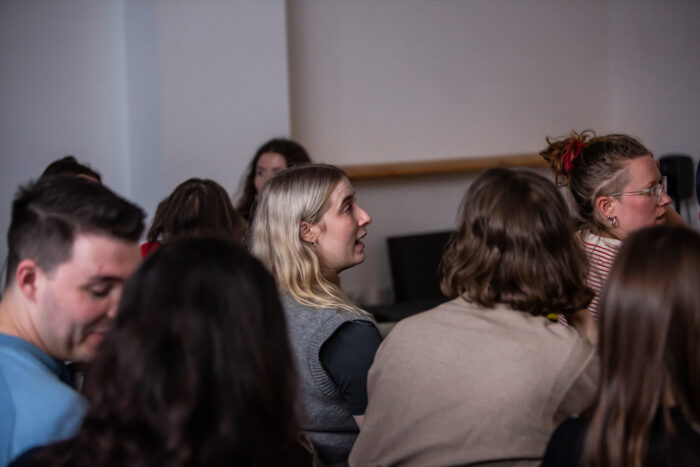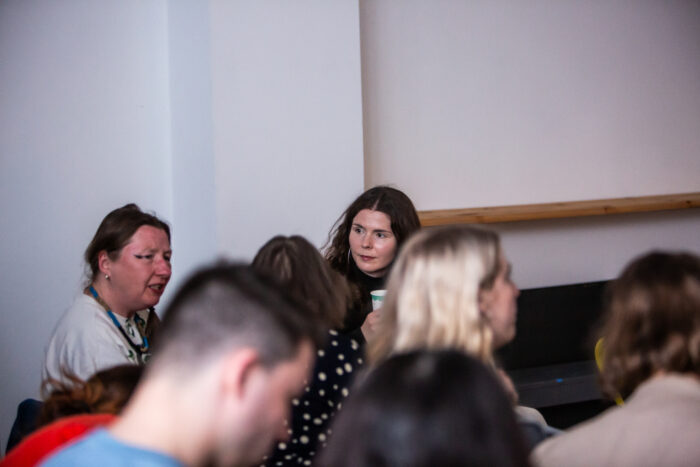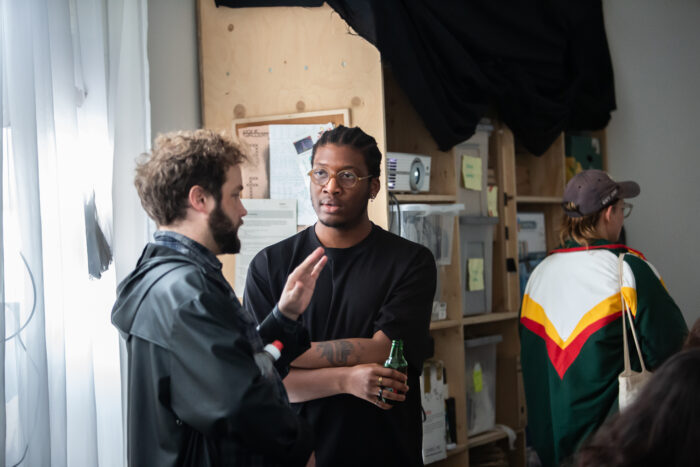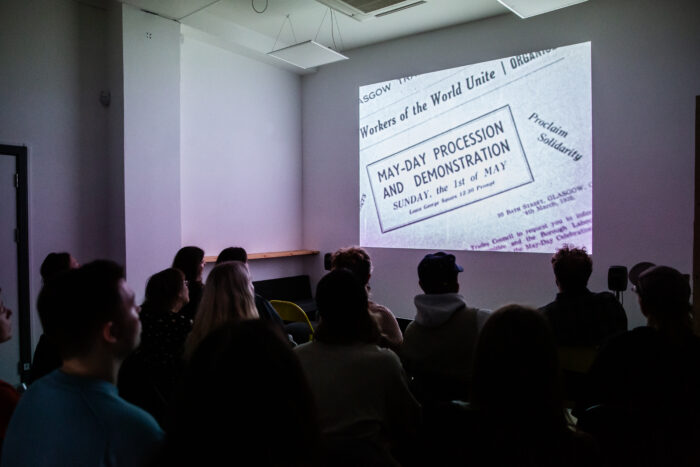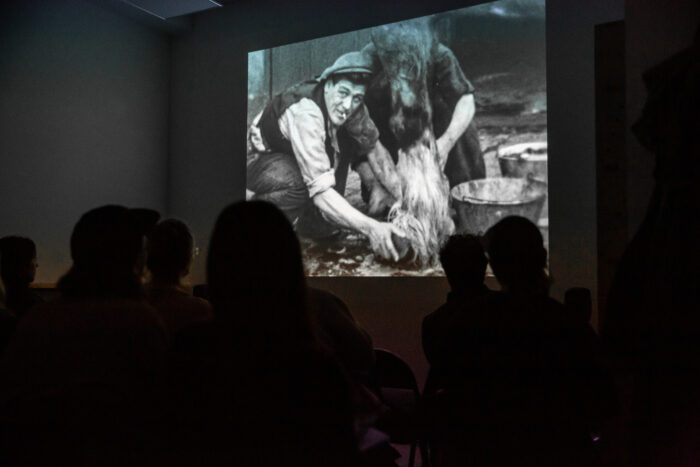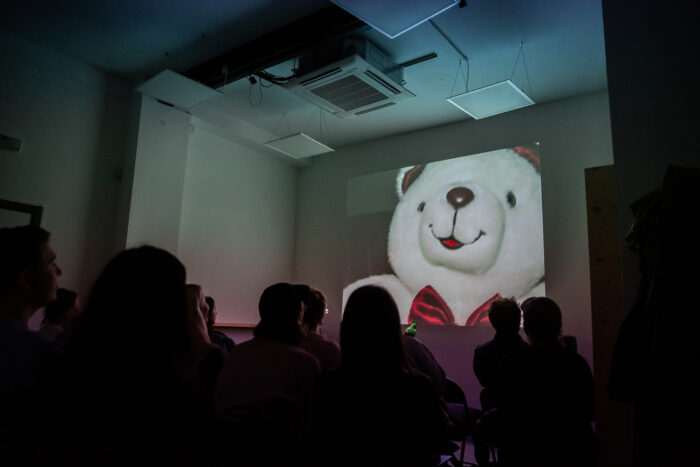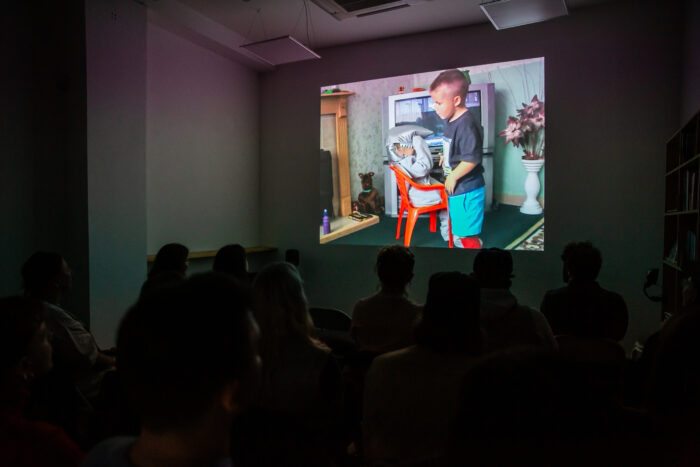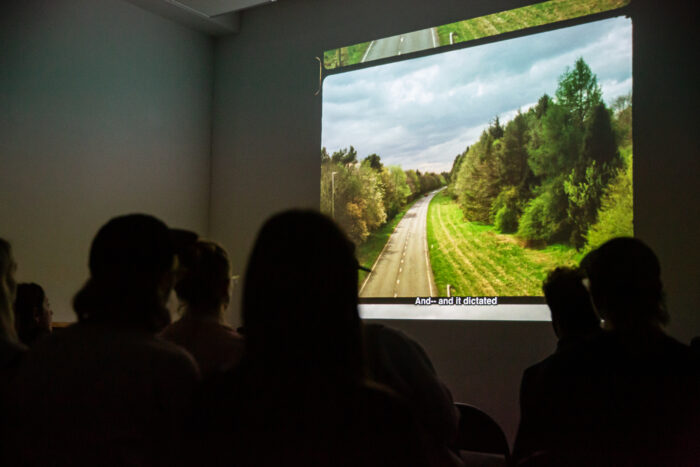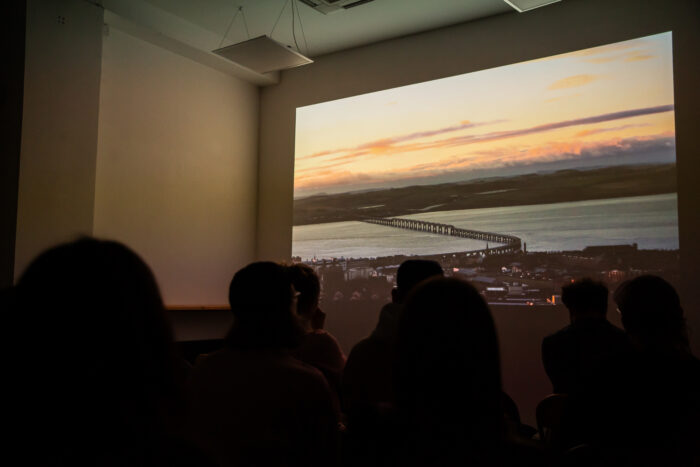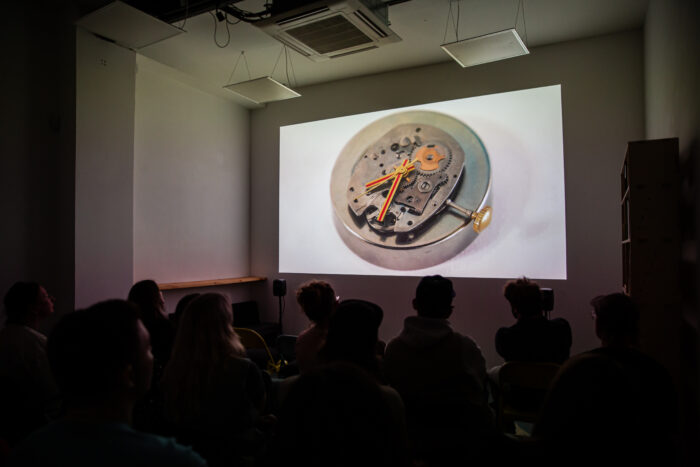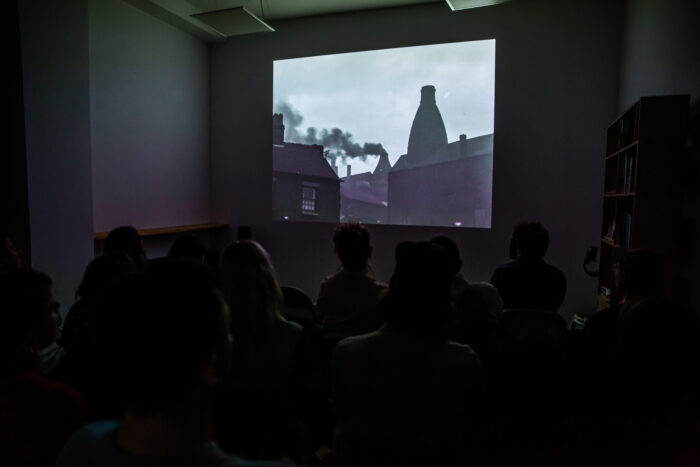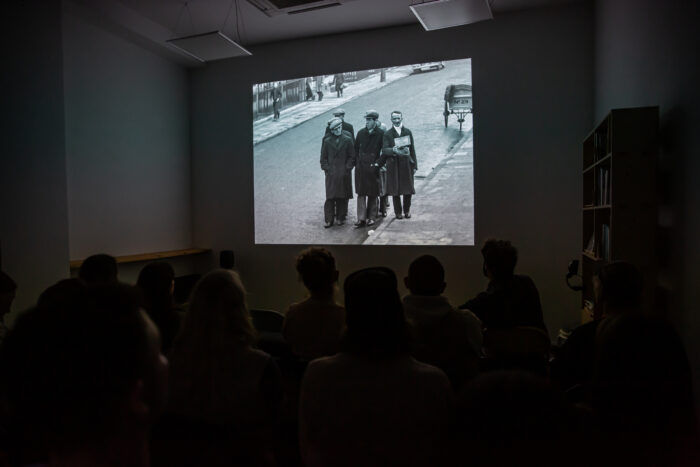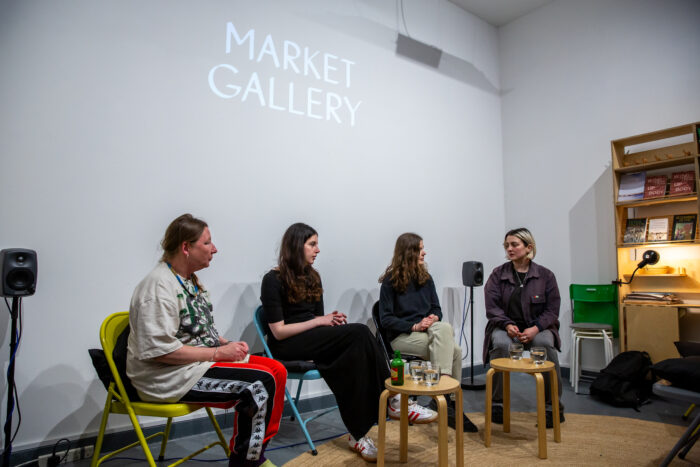Today We Live Screenings – International Workers’ Day 2024
Inspired by a viewing of Helen Biggar’s 1938, A Challenge to Fascism – a film which guides us through that year’s May Day march through Glasgow, we wanted to take the opportunity to honour Scottish filmmakers depicting and celebrating the lives of working people through archival films, alongside contemporary filmmakers.
We’re so delighted to have filmmakers Rachel McBrinn, Mandy McIntosh, and Stella Rooney show their work alongside Helen Biggar and Ruby Grierson. These five Scottish filmmakers demonstrate the best of our heritage and showcase some of the unbounding talent working today.
Join us on the evening of Wednesday 1st of May, at 6.30pm for a screening plus conversation with the artists.
The films will continue to show from Thursday 2nd until Sunday 5th of May as part of Glasgow’s May Day celebrations. The running time of the Today We Live programme is a total of 103 minutes and will begin at 10am, 11.45am and 1.30pm. (You do not need a ticket for screenings from Thursday 2nd -Sunday 5th of May.)
Find out more about the films, and filmmakers included below:

Helen Biggar, ‘A Challenge to Fascism: Glasgow’s May Day 1938’, 1938, 19 mins
Born in Glasgow in 1909, Helen Biggar was a sculptor, textile designer, theatre producer, filmmaker and activist. She was also an active member of the Glasgow Kino Group – a politically-influenced group that screened anti-war and socialist films across the city, that regularly fundraised on behalf of anti-war causes. She’s most well known for Hell Unltd, 1936, a film made in collaboration with Norman McLaren. Hell Unltd, is a more experimental film that is a scathing message to governments for their munitions spending. Before moving to London permanently in 1945, Biggar was also a stage designer for the Workers’ Theatre Group.
A Challenge to Fascism: Glasgow’s May Day 1938, is the final film work made by Biggar, with assistance from others from the Kino Group, and from the Glasgow School of Art. It begins with the preparations for the city’s May Day march, through the city, then ending at Glasgow Green, and takes us on the silent journey with the demonstrators. It exists as an artefact to international solidarity (banners baring ‘Arms for Spain!’ And ‘Workers of the World Unite!’) as well as an inspiring look at how far we have come, and work yet to do.
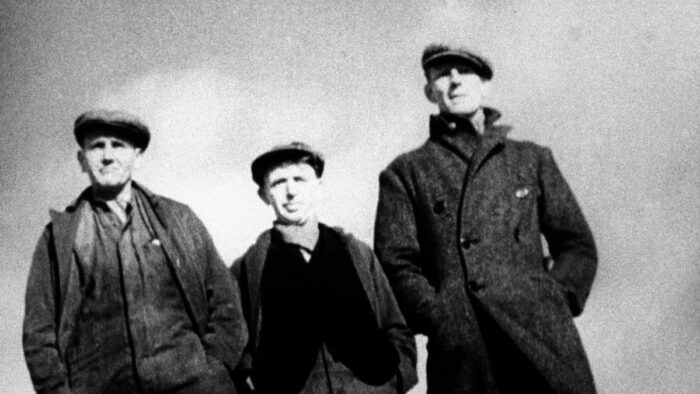
Ruby Grierson (co-director), To-day We Live: A Film of Life in Britain, 1937, 23 mins and 53 seconds
Born in 1909, near Stirling, Ruby Grierson was one of seven siblings, and of the seven, three of them went on to be prominent filmmakers. After various uncredited production roles on films, Grierson went on to direct her own, and has even been credited as being the first to have interviewees speak directly to the camera – something we take for granted now, but groundbreaking at the time.
Battling against the work of her brother, ‘The Father of Documentary’, it’s difficult to resist wondering where Grierson’s promising career might have gone, as her life was cut short whilst she took part in an effort to depict people’s lives during the war. She died in 1940, making a film for the Canadian Film Board about British evacuees on the SS City of Benares after it was torpedoed mid-Atlantic.
A beautiful example of the social-issues led filmmaking of the 1930’s and 40’s Documentary Movement, and ‘starring’ non-actors, To-day We Live, shows the rural experience in Britain in the inter-war period. Ruby Grierson directs a group of women in Gloucestershire who endeavour to turn a into a community centre, whilst Ralph Bond directs unemployed coal miners in the Rhonda Valley whilst they look to build an occupational centre. Made for the National Council of Social Service, the film has been praised for an objective look at a bureaucratic process that gave communities power in the aftermath of the Great Depression.
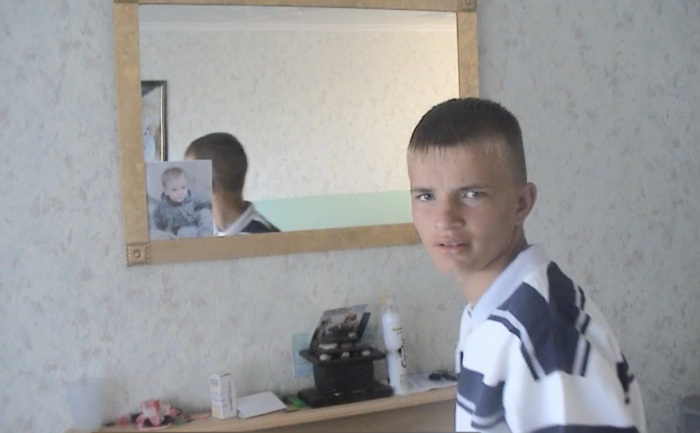
Mandy McIntosh, Fair Creature, 2004, 15 min and 54 seconds
From 2002 to 2004 Mandy McIntosh worked as an artist in Saltcoats with Pixelcurious, a Council funded initiative providing access to arts for local mothers using a nursery adjacent to the studio. Christine Gibb began taking a new video camera home with her and bringing back footage of her family which had been shot in the interim. The power of the footage lay in the multiple perspectives, collective cinematography and the act of using the camera as both a toy and a fly on the wall. Mandy encouraged Christine to keep the camera as a live element in her life and allow the novelty of it for her children to expand. The resulting bricolage film, edited and scored by Mandy, offers an insight into a mother’s life in Saltcoats among her children and friends, delivered in an assemblage of authorship. Christine’s children are now adults with kids of their own and she has ten grandchildren.
Mandy McIntosh is an artist from Springburn who works across disciplines including film, sculpture, community arts and printmaking. Her films, commissioned documentaries and animations have been screened and broadcast nationally and internationally since 1996. In 2004 her interactive digital artwork Weightless Animals won a BAFTA. She has worked predominantly in peripheral communities including Castlemilk and Ferguslie Park in long termist projects with local people which respond to class conditions. She recently showed REPEAT PATTERNS 2023 at GOMA using social history research and auto ethnographic insight to discuss chronic civic neglect in the North East of the city as evidenced through the state of public sculpture. Currently in Springburn she is working with Springburn Unity Network, a peer support group of asylum seekers and refugees. She is a practice based PhD candidate at Glasgow School of Art.
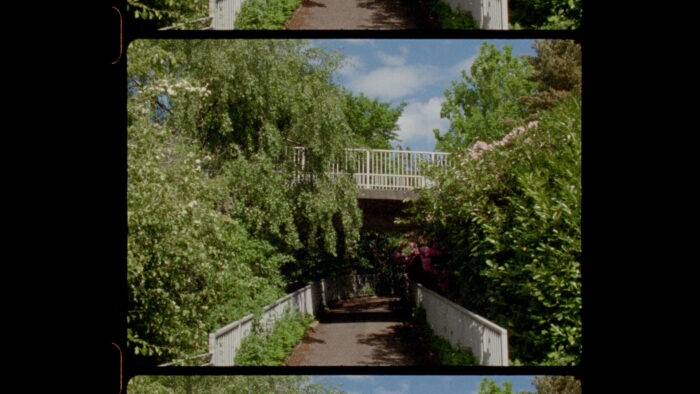
Rachel McBrinn, Are you going my way?, 2023, 23 minutes
Are you going my way? is a film rooted in the filmmaker’s hometown Livingston, one of Scotland’s five post-war New Towns. With contributions from Dean Swift, former landscape architect for the Livingston Development Corporation, and residents (past and present) of Deans South, one of the first council housing schemes in Livingston which is currently undergoing demolition, the film positions the town as a home for divergent and complex narratives which emerge from cycles of building and demolition, growing and felling, planning and waiting. The film and accompanying publication, Winding Up Body, were developed during a research-led residency supported by Rhubaba.
Rachel McBrinn is an artist and filmmaker based in Edinburgh. Her filmmaking practice is rooted in conversation and relationship building, and often emerges from long term site-responsive and archival research. With a critical lens on conservation, maintenance, and archiving practices, recent work has formed around themes of land management, town planning, and urban and rural ecologies. She has a collaborative practice with artist Alison Scott, together receiving the Argyll Beacon Film Commission from Cove Park and ACT in 2022, and now working as artists in residence at St Andrews Botanic Garden for 2024.
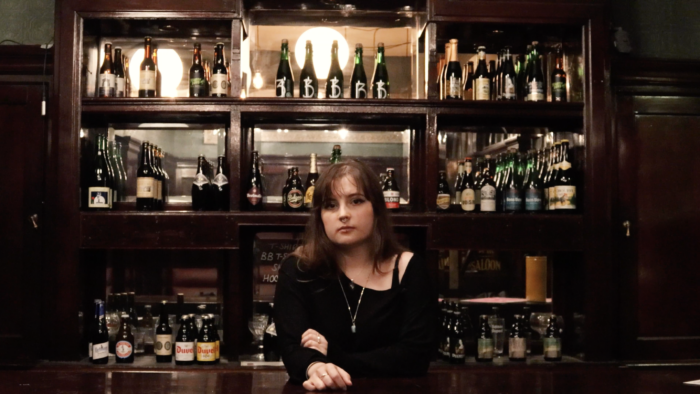
Stella Rooney, She Town, 2022, 22 minutes 5 seconds
She Town is a moving image piece and short publication produced in 2022. The work is influenced by the women of Dundee and their role in shaping the city’s industry. Former mass employers, the Jute mills and Timex factories, employed predominantly women workers and earned Dundee a reputation as a matriarchal city. Today, most factories and mills are long closed and many women now work within the care and service sectors, with often lesser working conditions. Rooney charts the trajectory of Dundee’s matriarchal culture and examines the legacy of working-class women’s leadership within a city still yet to recover from deindustrialisation.
She Town, was exhibited at RSA New Contemporaries 2022 and was awarded the National Library of Scotland purchase prize for moving image.
Stella Rooney is an artist and organiser living in Glasgow. Working across photography and moving image, her practice is a point of engagement with collective histories. Her process involves considered research in tandem with the production of new material through interviews and image-making.
Stella invites discussion on personal and collective memories of labour. Aiming to provoke conversations which do not dwell on nostalgia, but instead use local histories as a basis for meaningful reflection and learning. Through understanding past struggles, she situates the politics of today within a historical context, aiming to identify past, present and future points of solidarity.
Since graduating from Duncan of Jordanstone in 2020, Stella was selected for a year-long culture collective residency with StreetLevel Photoworks and Hospitalfield Graduate Programme. Her project ‘She Town’ which explored the role of women in Dundee’s industry and politics, was shown at RSA New Contemporaries and awarded the National Library of Scotland Purchase Prize for Moving Image.
All photos bellow by Erika Stevenson.
